- Home
- Matt Hilton
Tempus: The Phoenix Man Page 16
Tempus: The Phoenix Man Read online
Page 16
‘A fate I will not even contemplate.’ Semple’s eyes practically gleamed with the intensity of denial. I won’t be punished in any court of law!’
‘We know that machine of yours works, Terrence. If the worst comes to the worst then…’ Coombs allowed the suggestion to stand between them.
‘You are on good terms with George Fox,’ Semple said. ‘Speak with him. Get him on side. We’ll require his expertise.’
‘What of the others? Heller? Doherty? They could prove troublesome to such a plan.’
‘They’re as expendable as Rembrandt,’ Semple said with a shrug.
Rembrandt’s team was waiting for him in the anteroom outside the transdimensional jump chamber. They were conversing in low tones as he entered, Walker’s every second word was of the four-letter variety. Although the room was sterile, Rembrandt could smell the raised testosterone from the men as they girded themselves for the mission. He studied them wryly, taking in their clothing and realising he’d probably got off better than most. Walker, the youngest of the group, had even had his hair styled in an eighties cut, floppy on top, shorn up to a wedge at the back. Oxford and Bowlam both sported short crops, while Dhand had pulled his long hair back into a ponytail that was fixed by a rubber band near the nape of his neck. The biggest surprise was Crystal Kwolek, and Rembrandt didn’t realise he was staring until she stirred self-consciously and pulled down the hem of her skirt.
Kwolek had always been “one of the lads” and treated exactly as such. Dressed in baggy coveralls, and toting an assault rifle, her fair hair usually scraped back off her face, she was the definition of asexual. Even the few occasions he’d seen her out of uniform, generally as she headed for the ‘Red Bus’ to take the trip back to a dorm house in which most of the team lived, she’d been dressed in a loose slicker over jeans and boots, a scarf around her face and hair. It was the first time he’d noticed that she had long, slim, perfectly formed legs. Perhaps the heels on her shoes helped, or the hem of her skirt riding around her knees, but Rembrandt experienced warmth stirring in him that he’d never associated with Kwolek before. She wore a lilac blouse tucked into her waistband, and over it a blue blazer with gold buttons, shoulder pads sharp. Her fair hair – often dark with sweat and grime in the past – was curled and coiffed and shone under the overhead lights. Make-up accentuated her large eyes and plumped her lips. Rembrandt found himself clearing his throat, and forcing himself to look elsewhere. Bowlam and Walker nudged each other at his expense. Oxford frowned at his own feet.
‘Everyone ready?’ Rembrandt asked.
There were two large suitcases, a smaller rigid Samsonite briefcase, and a tubular cardboard roll, the likes used for transporting reams of fabric, sealed at both ends. Kwolek also carried a handbag over her shoulder, and inside it were rolls of money from the late 1980s gleaned from where Rembrandt had no idea.
‘Question, Chief?’ Walker limped slightly on his wounded leg as he approached, but largely he’d got over his injury.
‘Go for it, Brent.’
‘Last time, when we, uh, jumped here, there was no sense of movement. Will it be the same this time?’
‘It’s instantaneous, if that’s what you’re asking? One second we’re here -’ Rembrandt clicked his fingers ‘- then we’re there. There’ll be no sense of motion, or time. For all I know we actually are in some state of limbo for ages, but there’s no conscious sense of it.’
‘So if something goes wrong we’ll just blink out of existence?’
‘Nothing will go wrong. I jumped to eighty-eight and back again and everything went to plan.’
‘What about the first time, when you went back? They fucked up that time, lost contact with you and you were stuck over there.’
‘There was a glitch with my original implant. Whatever made it fail, Doherty’s techs have fixed. You don’t have to worry, Brent. What’s more concerning is if Fox gets the calibration wrong and beams us into the middle of a motorway at rush hour, or worse, six feet underground surrounded by concrete.’
‘Jesus, I feel much better now,’ Walker said.
Rembrandt clapped him on the shoulder, shared a grin with him.
‘Anyone else got any last minute questions? Time’s wasting here, folks.’
Benny Oxford slowly mouthed the words “Time’s wasting”, then allowed a grunt of laughter. He checked the others to see if any of them found the phrase as ironic as he. Apparently not: he went back to frowning at his shoes.
‘OK, then, if we’re ready, let’s be off,’ Rembrandt said. Oxford lifted the suitcases, Walker the Samsonite briefcase, Bowlam the cardboard tube. Rembrandt turned to the observation windows, noting the hive of activity as the scientific team prepared the Tempus chamber for action. Dozens of lab technicians were seated before computer monitors, fingers playing keyboards with the dexterity of master pianists. Doctor Heller, red hair swept back from her face in a way that made her green-eyed expression more distinct than ever, watched from behind a console desk. Since fleeing the conference room earlier she had been distant, and had brushed off any questions about her well-being. Now she appeared…Rembrandt couldn’t put his finger on her expression. Expectant? Hopeful? Concerned? They were emotions he hadn’t associated with her before.
Standing behind Heller, his hands fed into the front pockets of his corduroy jacket, Doherty pursed his lips, eyeballs jiggling as he thought furiously. At the far end of the room, Semple and Coombs entered the control room and moved forward to join the others. Rembrandt nodded at them both in turn. Then he turned for the airlock door, hearing the pneumatic pistons working the locks.
A comms-link was opened and George Fox began to speak, guiding the team into the airlock, where they were doused with UV light and the disinfectant gases. It was as important that transference of germs and viruses was controlled from this end, as it was anything brought back. The process of decontamination completed, Fox finally directed them into the Tempus chamber. After the previous transvections, cleaning teams had scoured the chamber and it glowed white, the ambience fed by the walls themselves, that under scrutiny reminded Rembrandt of the inner surface of an oyster shell. If viewed at certain angles he could almost imagine the shimmer of mother-of-pearl along the smoothly curving surfaces.
Fox continued his scientific chatter, talking the team through the process, orchestrating their positions on the elevated walkway, and also reminding them needlessly not to set down any of the equipment they were transporting with them – there had to be close contact to inanimate or inorganic objects for them to be carried alongside the person to its final destination. Much of what the technician talked about was lost on the others, but Rembrandt had taken on enough to understand the process. The super computers in the adjoining control room monitored their vital biorhythms at a subatomic or quantum level, and by “reaching out” could fix onto like vibrations in any place or time their twins existed. By calibrating the two it was a case of switching, and as Rembrandt had pointed out to Walker, the process was immediate and largely without comprehension – transvecting could take an instant or an eternity, but once done there was no memory of either. While in the parallel time and place, the computers remained locked onto the implants’ own unique transmissions, and their human hosts could be pulled back again to the here and now. It seemed that the only limitation to Terrence Semple’s time and dimension machine – or more rightly his transvection machine - was that it could only transport a human backwards and sideways, never forward, and only to a time frame in which that person had been alive. But Rembrandt thought that if time was constant and contemporary then those were problems that Doherty, Fox or some other genius would figure out.
Fox counted down.
‘Five, four, three…’
Rembrandt said, ‘Here we go.’
‘Two, one, initiating –’
Chapter 20
January 26th 1988
Regent’s Park, London
‘Welcome to London, folks,’ Rembrandt sa
id less than three seconds after George Fox transvected them, or thirty years earlier depending on their outlook.
Without exception, the others stood looking around in awe. It was predawn, darkness surrounding them, but beyond a solid wall of foliage lights twinkled, and the roar of traffic along the A501 Marylebone Road was relentless even at this early hour. The thrum of engines, honking horns, and an emergency siren all drifted across the park to them. They were sounds uncommon in the Old City version that they were familiar with.
‘Is this really grass?’ Walker asked as he pushed his heels into the turf. The Regent’s Park he was familiar with was a windblown expanse of ash drifts piled on semi-fused dirt that looked more like a lava flow than the plush foliage here. ‘Fuck me; I forgot what this stuff felt like. And look…trees!’
The others gawped along with him, but for only as long as it took Rembrandt to urge them on.
‘We’re not visitors on a sightseeing tour. Get a hold of yourselves. Keep the kit close and let’s move.’
They’d been transported to pre-dawn Regent’s Park so there was little chance of anyone witnessing their arrival and causing pandemonium. Rembrandt didn’t want their cover blown by the over-exuberance of his team, though he fully understood their wonderment: he’d been similarly struck when taking the trip back to collect the newspapers. They were to the west of the Inner Circle, a stone’s throw from the boating lake. Rembrandt feared that if his team caught sight of the expanse of water there’d be little he could do to halt them taking an impromptu skinny dip.
He quickly led them over the softly undulating ground, taking a route around the buildings of Regent’s College to York Bridge, where he allowed them to gather themselves. Briefly Ox and Kwolek stood at the parapet of the bridge, peering down at the thin strip of lake beneath. They glanced at each other, Kwolek up, Oxford down, and Rembrandt thought that they might have held hands romantically if it weren’t for Ox lugging the inordinately heavy suitcases.
‘OK, we’re going to head across the Outer Circle towards Marylebone Road, then take a right for the tube station at Baker Street. Kwolek, you’d best get out some of that cash because we’ll need tickets to ride the train. Ready? Good. Try to act inconspicuous will you?’
Despite his warning he knew that their inquisitiveness would betray them: but he guessed there were plenty of tourists who looked equally as out of place in the big city. Approaching the exit from the park, they saw homeless people lying beneath coats and blankets, and a fortunate few also had sleeping bags. It was the first sign that was synonymous with the time and place that they recognised. The scavenger groups of Old City often converged on one place like this, the difference being you’d never willingly walk by them without displaying your weapons. Rembrandt saw his team casting wary glances at the sleeping figures.
One of the homeless people had a dog. It was a scruffy terrier, its fur matted. The homeless man probably used the dog as a prop to engender pity when begging for loose change. The scavengers also kept dogs. But they were trained to guard their belongings, or to attack on command. A dog that did neither usually ended up roasted over a fire. The terrier watched them pass by, one ear cocked, its soft gaze following them, and didn’t make as much as a yap: one for the cook pot.
Out on Marylebone Road, Rembrandt kept the group together. It was a dry morning, few clouds in the pre-dawn sky, but he could barely see a star because of the light pollution bleeding into the heavens. The sharpest lights were those on the Post Office Tower and further down town at Centre Point. They headed for the Baker Street tube station. People rushing for the trains jostled them, and Rembrandt worried that one of his team would grow impatient and kick an arse or two, but a quick check showed they were more bemused than angered. He took money from Kwolek and purchased tickets from a vendor, and they followed the crowds downstairs to the underground platforms. In Old City, some of the tube tunnels had survived, but even a heavily armed police team wouldn’t willingly enter them. He could feel the anxiety coming from his team in almost tangible waves.
He checked a map, saw the coloured lines that denoted the different rail routes, and waved the team to follow. ‘Look for the Jubilee Line,’ he said.
On the correct platform, they stood with dozens of early risers on their way to work. They needn’t have feared standing out in a crowd because no one took any notice of them. It was as if everyone was in a little place of their own, refusing to make eye contact or conversation. Some stood and read from battered paperback novels or newspapers, folded for the lack of space. Many of them wore running shoes beneath their power suits, even women, and toted more formal footwear along with them. Posters on the curved walls advertised the must-see movies of the day, or offered services on the end of a telephone line. There were also posters advertising the latest thrillers from Tom Clancy and Sidney Sheldon – The Cardinal of the Kremlin and The Sands of Time respectively – the titles of which Rembrandt thought most apt considering what was coming if they failed their mission.
They felt the approach of the tube train before it came squealing up to the platform, displaced air being forced through the tunnel ahead of it. Around them the crowd stirred as they readied to board the train. As the doors opened, the mass surged forward, and Rembrandt had to urge his team on to avoid being shoved aside. They squeezed into a carriage alongside dozens of others. Ox was forced to place down his suitcases, Kwolek sitting on one of them, because there was no way she’d get a seat otherwise. The others hung to the straps hanging from rails on the ceiling, swaying with the crowd as the train set off. They didn’t have to endure the press of humanity long, it was barely a five-minute journey down to Green Park Station where they’d alight.
By the time they climbed the stairs and headed for Piccadilly they looked like they’d endured worse than a train journey, the culture shock one that they hadn’t been prepared for.
‘Fuck,’ Walker moaned as he trudged along, toting the Samsonite case. ‘How did these people live like this? I’d forgotten how rushed everything was back then.’
Brent Walker must only have been a child when the bombs dropped, and though he’d lived in London before that, he wasn’t likely to have experienced the early morning rush hour when countless thousands descended on the city for work. The thought gave Rembrandt an uneasy feeling: out there somewhere would be the juvenile Walker, as well as other doppelgängers of his team…but not of him. Here in this timeline and place he wasn’t due to come kicking and screaming into the world for another ten years yet, a long time after the bombs were scheduled to drop. The realisation struck him and almost sent him reeling, more than if he’d bumped face to face into a facsimile of himself. Jesus, he thought, glancing at Walker’s fresh features, how fucking weird is this time travel stuff? Walker was born in 1980, as he recalled, eighteen years before David James Johnston was in ’98, and yet because of Rembrandt’s time hopping Walker was now eleven years his junior. Shit, to think about it made his head hurt. He stopped thinking, and guided the group across Piccadilly to Bolton Street where he’d previously scoped out a hotel where they could set up base.
Bolton Street was dominated by Georgian townhouses, most being five or six storeys high - including cellars and dormer rooms in the attic spaces - with decorative iron railings and balconies to embellish the red or grey brick fasciae. Property here would be expensive, and so would room hire in the only hotel on the street. But Doctor Heller had vectored in the cost of living and supplied enough cash to keep them as kings for the few days they intended staying there.
Rembrandt and Kwolek approached the checking-in counter, paying for three double rooms with cash from her handbag. They booked a four night stay – if they were successful in stopping the assassination due in just a little over one hundred hours, then they wouldn’t return to the hotel: if they were unsuccessful, they wouldn’t return either.
Taking the bags upstairs, the group converged in a third floor hallway, while Rembrandt divied up the room keys.
&nbs
p; ‘Want to share my room, Kwolek?’ Walker asked, jangling his key on the end of a huge leaf-shaped fob.
‘Dream on, Casanova,’ Kwolek told him.
Rembrandt handed her a key. ‘Kwolek gets her own room. I’ll bunk in with Jamal and OX. Walker and Bowlam, I’m sure you don’t mind snuggling up to one another?’
‘Long as you don’t steal all the duvet,’ Walker grinned.
‘Long as you don’t fucking snore,’ Bowlam said.
‘Your room has single beds,’ Rembrandt pointed out, ‘but you can always shove them together if you prefer.’
‘Don’t forget, I’m sleeping with my bum cheeks clenched and a gun under my pillow,’ Bowlam growled at his pal, to a chorus of laughter.
‘I don’t mind sharing, Chief,’ Kwolek said.
‘Yeah, you and Ox?’ Walker watched the big man’s face flicker with mixed emotions, but his hopes were dashed a moment later by Rembrandt.
‘You don’t get a room all to yourself, Kwolek, we’ll use your room for OR. But at least you’ll get some privacy when sleeping and bathing.’
OR was slang for Operating Room. They’d set up a FOB - Forward Operating Base - nearer to Grosvenor Square in the next day or so, along with a secondary fall back location should the shit hit the fan.
Kwolek opened her room, and gave a tiny gasp of delight. The others crowded her to check out the lavish furniture and huge TV, and the en suite bathroom.
Bowlam whistled softly. ‘Just look at the size of that bed.’
King-sized mattresses were unknown commodities both in their dorms at Old City, and also in the billet style rooms they’d used at the Tempus facility.
‘We may as well make ourselves comfortable,’ Rembrandt said, happy that he’d decided to treat his team, rather than follow the obvious and check into a low-end hotel. ‘Now, come on, let Kwolek settle in and we’ll convene in an hour.’

 The Girl on Shattered Rock: A gripping suspense thriller
The Girl on Shattered Rock: A gripping suspense thriller Collision Course
Collision Course Blood Kin
Blood Kin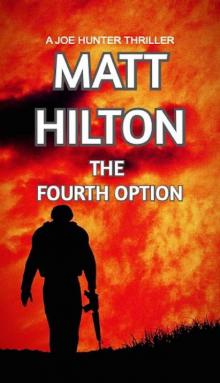 The Fourth Option
The Fourth Option Hot Property: A Joe Hunter Short Story
Hot Property: A Joe Hunter Short Story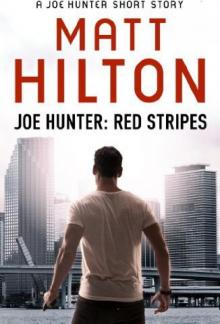 Red Stripes
Red Stripes Dead Men's Dust
Dead Men's Dust Judgement and Wrath
Judgement and Wrath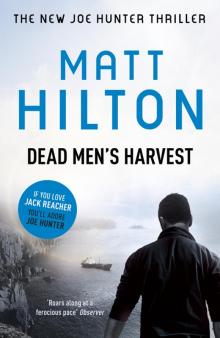 Dead Men's Harvest
Dead Men's Harvest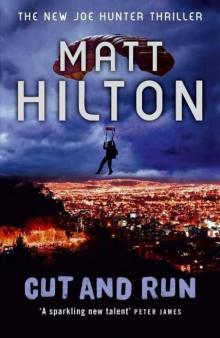 Cut and run jh-4
Cut and run jh-4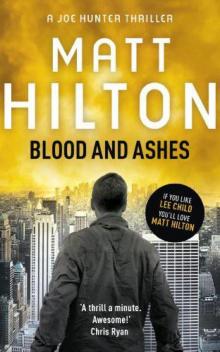 Blood and Ashes jh-5
Blood and Ashes jh-5 Preternatural: Carter Bailey Book 1
Preternatural: Carter Bailey Book 1 Darke
Darke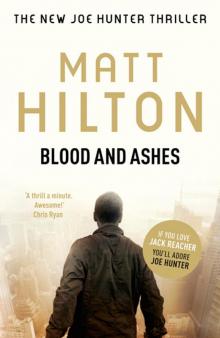 Blood and Ashes
Blood and Ashes The Shadows Call
The Shadows Call Raw Wounds
Raw Wounds The Devil's Anvil
The Devil's Anvil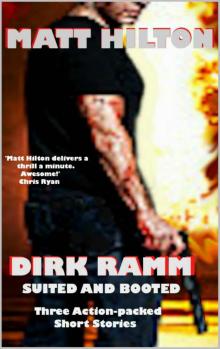 Dirk Ramm: Suited and Booted
Dirk Ramm: Suited and Booted Dead Men's Harvest jh-6
Dead Men's Harvest jh-6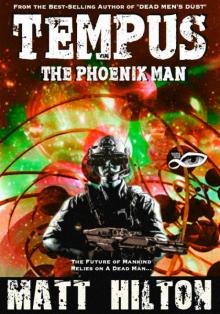 Tempus: The Phoenix Man
Tempus: The Phoenix Man Painted Skins
Painted Skins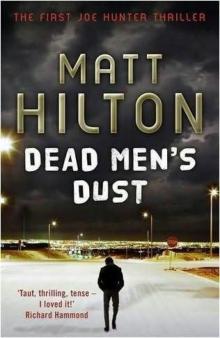 Dead Men's Dust jh-1
Dead Men's Dust jh-1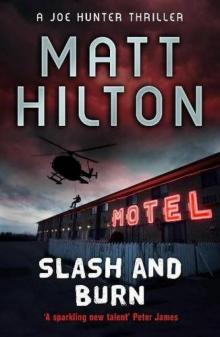 Slash and burn jh-3
Slash and burn jh-3 Dead Fall
Dead Fall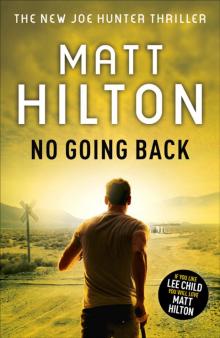 No Going Back - 07
No Going Back - 07 Judgement and Wrath jh-2
Judgement and Wrath jh-2